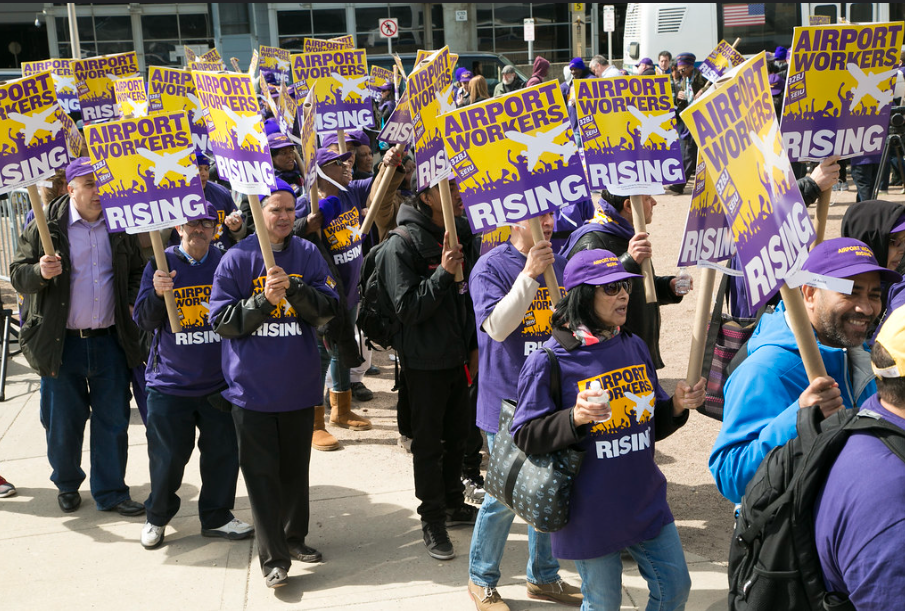FTC Orders One of Largest Building Services Contractors in U.S. to Halt Enforcement of Exploitative No-Hire Agreement Following 32BJ SEIU Complaint

FTC Orders One of Largest Building Services Contractors in U.S. to Halt Enforcement of Exploitative No-Hire Agreement Following 32BJ SEIU Complaint
Planned Companies’ restrictive covenant trapped essential workers in low-paying, non-union jobs, stifled their career opportunities and growth, while reducing fair competition
Newark, N.J. — The Federal Trade Commission has ordered Planned Companies, based in New Jersey and one of the largest property management contractors in the country, to halt enforcement of the company’s restrictive covenant, a no-hire agreement that hampered its workers’ career and financial growth, reduced worker bargaining power and stifled fair competition practices.
Planned’s settlement with the FTC follows a complaint filed by 32BJ SEIU. The union was represented by Towards Justice, a non-profit law firm.
Planned’s restrictive covenant, a provision in its contracts with buildings, prevented buildings, directly or through a successor contractor, from hiring any of its workers for 6 months after Planned loses an account or their employment is otherwise terminated. If a building decided to hire one of Planned’s employees within that 6 month period, the building’s owner/manager would pay a penalty of 3 months’ salary for each Planned employee hired.
The provision kept thousands of concierge, maintenance, security and custodial workers trapped in low-wage, non-union work with insufficient benefits. Building residents often develop close relationships with these staff, who provide essential services, but buildings are prevented from hiring them directly or through other contractors where they could be paid more and treated better.
With more than 3,000 workers, Planned is hired to provide services largely in New Jersey and New York commercial and residential buildings, but also has a presence in the metro regions of Boston, Washington, D.C., Atlanta and San Francisco.
The restrictive covenant also meant that building owners risked losing all of their service workers if it switched to a competing building services contractor.
In her statement along with the order, Chair Lina Khan thanked the FTC for “securing an order that will free workers and businesses from undue restraints of trade in an industry that employs hundreds of thousands of Americans.”
The FTC settlement requires Planned to:
- Stop putting the restrictive covenant in its contracts with buildings.
- Rescind any existing restrictive covenants.
- Send a letter to all customers that had a restrictive covenant announcing the rescission and provide a notice to employees and new hires that Planned no longer has a restrictive covenant.
- Planned must also post a notice in affected work sites.
Alongside their anticompetitive practices, Planned had also been telling workers that they’d lose their jobs if they sided with the union. This order proves otherwise; unions protect workers.
“Planned Companies’ Restrictive Covenant was no more than a bondage fee that trapped workers in low-paying jobs with few meaningful benefits. The company kept its employees in the dark while it hampered their career opportunities and mobility. We applaud and thank the FTC and the NLRB for pursuing their investigations into Planned and ensuring that Planned employees get justice, with the result being that more workers are emboldened to challenge exploitative practices by their employer. Planned’s workers were never Planned’s property,” said Ana Maria Hill, New Jersey State Director for 32BJ SEIU.
“This order is a huge win for working people across the country. It reinforces the basic point that employers can’t use contracts with other businesses to keep their workers captive. As this order reminds, the threat of being able to go work somewhere else is fundamental to worker bargaining power and a fair market. We are proud to stand up for thousands of building services workers in helping to achieve this result,” said David Seligman, Executive Director of Towards Justice.
Planned Companies has a history of paying its workers poverty wages with few meaningful benefits, engaging in wage theft to the tune of hundreds of thousands of dollars and repeatedly breaking federal labor laws. In 2017, the Northern New Jersey District of the U.S. Department of Labor investigated Planned and found the company had engaged in wage theft by failing to pay the full overtime wages owed for training periods to more than 500 employees, ordering Planned to compensate employees for more than $60,000 in stolen wages. Over the past decade, the New Jersey Department of Labor has cited Planned’s various divisions for numerous other wage and hour violations, including for failure to pay the full wages owed to residential workers in Hoboken, Weehawken, Elizabeth, West Long Branch, Lakewood and Trenton.





